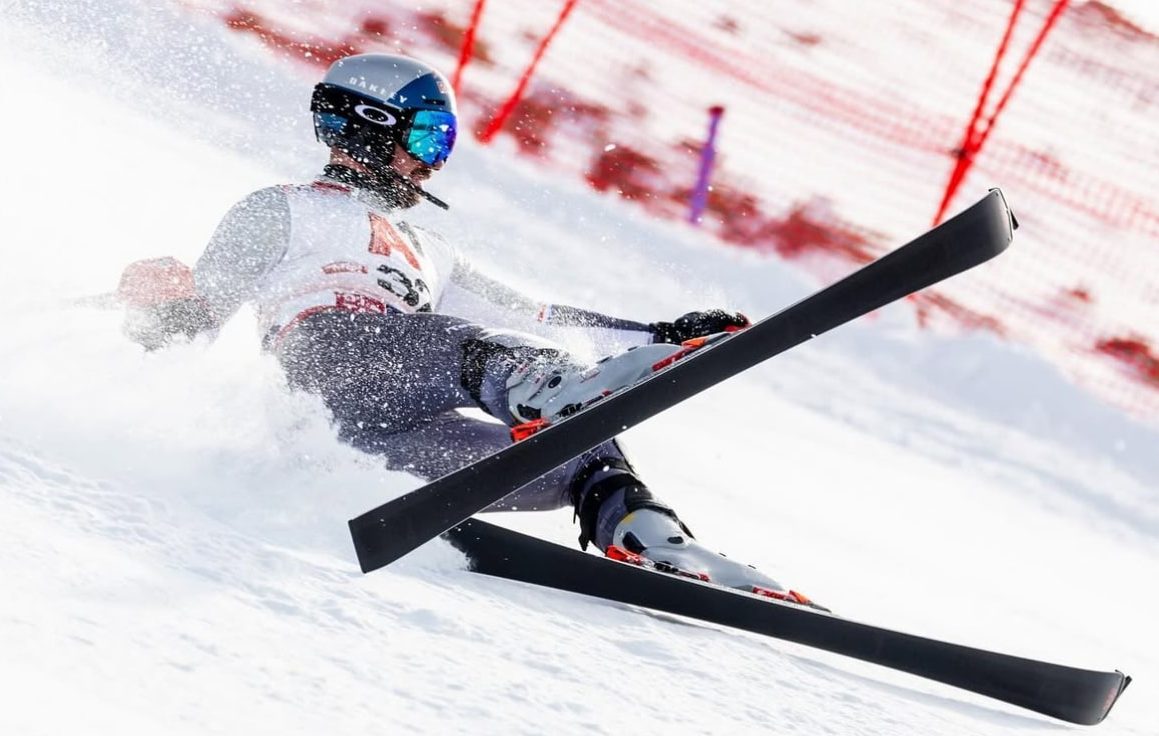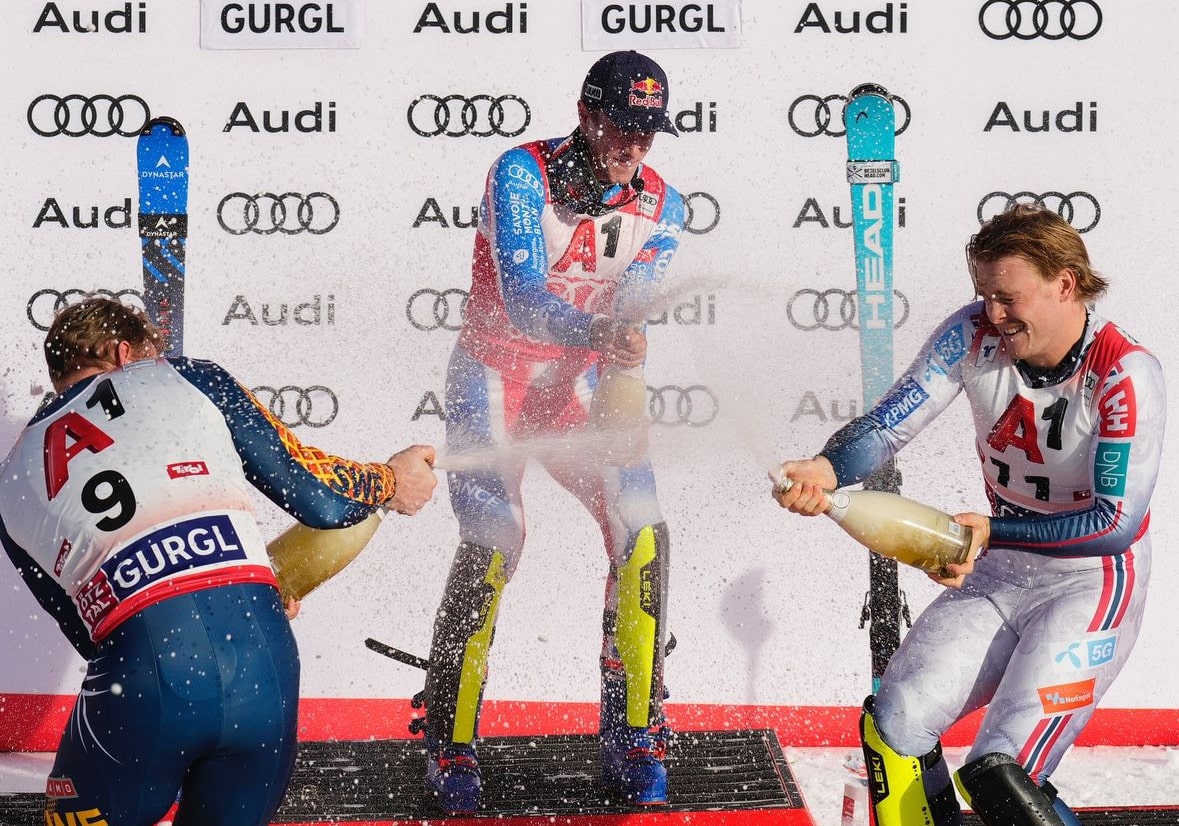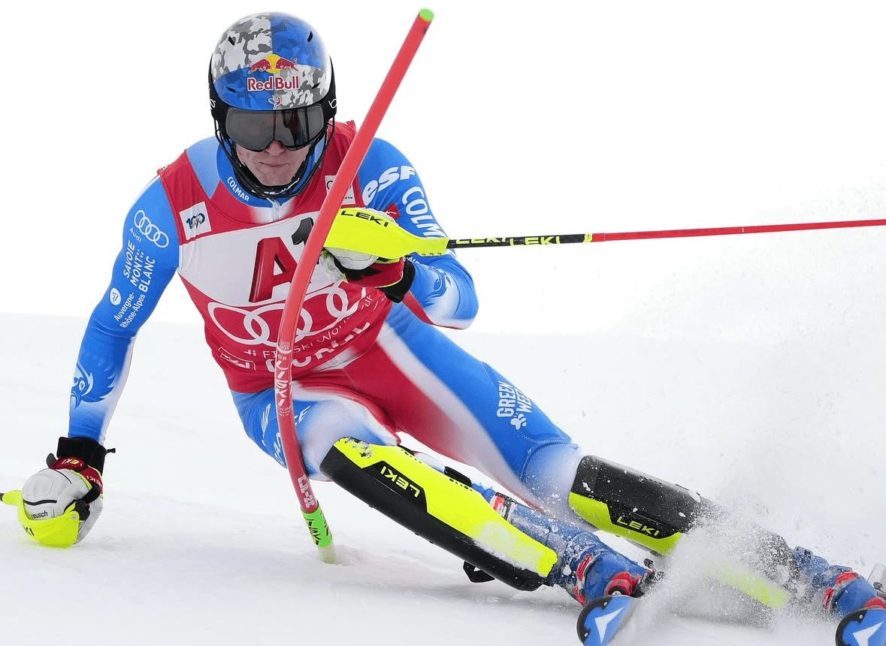
France’s Clément Noël made it two-for-two at the Slalom World Cup in Gurgl, Austria, on Sunday, November 24, backing up from his victory in Levi, Finland, last week. Much like Shiffrin in the women’s Slalom yesterday, Noël was dominant from the get-go, leading after Run 1 with 0.88 seconds ahead of Norway’s Atle Lie McGrath and 0.94 seconds ahead of teammate Steven Amiez.
In what can only be described as a race full of upsets, the 2022 Olympic Slalom Champion showcased his signature resilience on the slopes, claiming his 12th career victory. Rounding out the podium at Gurgl on Sunday were Sweden’s Kristoffer Jakobsen and Norway’s Atle Lie McGrath, who finished 0.43 and 0.44 seconds behind Noël. Typically, men’s Slalom races have really close finishes, so to see Noël win by almost half a second margin was unusual. In fact, the race started rather unusually.

Run 1
Linus Strasser, in bib 1, battled the tough, icy course and could not find his rhythm. Noël, in bib 2, on the other hand suited the run, and he crossed a staggering 3.16 seconds ahead of the German. Strasser’s time was, in fact, so slow, that he failed to qualify in the top 30 and, thus, for Run 2. Likewise, Norway’s Timon Haugan, in bib 3, battled the steep and tight course, crossing the finish line 2.26 seconds behind Noël, which saw him finish run 1 in 26th place. Teammate Kristoffersen, in bib 5, did slightly better but still was 1.76 seconds behind, slightly better than Switzerland’s Loic Meillard, in bib 4. Even worse fared Manuel Feller, in bib 6, who on Austrian home ground ended with a disappointing DNF after straddling a gate. It gave David Ryding, in bib 7, the chance to shine, and the British Slalom specialist managed to ski in 1.23 seconds behind Noël into what was ultimately fifth place on Run 1. The top seven ranked skiers have the special privilege of being in a separate bib lottery for bibs 1-7, guaranteeing them the best starting spots, so it was unusual to see such big time gaps between Noël and the other top Slalom skiers and to see so many fail. However, it left the opportunity for fresh faces in the top ten.
Notable performances on Run 1 came from Albert Popov from Poland, in bib 21, who was one of the few skiers today who did not struggle with the course at Gurgl and qualified for Run 2 in sixth place, 1.29 seconds behind Noël. Belgium’s Armand Marchant, in bib 30, qualified for Run 2 in 10th place, while Finland’s Eduard Hallberg, in bib 39, filed in right behind him in 11th place.
Team USA’s Benjamin Ritchie in bib 48, who had impressed with a personal best 13th place at Levi last week, qualified for Run 2 in 15th place. Ritchie’s teammates River Radamus, Luke Winters, and Jett Seymour also raced Run 1 but failed to qualify for Run 2, recording a 36th, 44th, and DNF, respectively.

Meanwhile, DNFs were recorded by comeback stars Lucas Braathen in bib 29 and Marcel Hirscher in bib 32. Braathen was looking strong on the top section of the course and was ready to attack, but the Norwegian-turned-Brazilian straddled a gate, ending his bid for the podium prematurely. Braathen did not let that deter him from letting the adoring crowd celebrate his return to the World Cup circuit in the finish area. Likewise, Marcel Hirscher went in with great aggression and attacked the gates but looked ill at ease, and the tight course setting caught out the 65-time World Cup winner, seeing him slide out on the top section of the course, unable to recover and he slid undignified past the next gate on his backside.

Run 2
For Run 2, the tech teams must have worked overtime to ensure skiers had the right grip on the difficult surface at Gurgl. Race times more accurately reflected skiers’ true ability. Timon Haugan, who had struggled on Run 1, skied the fastest second run of the day, catapulting him into what was ultimately ninth place. Likewise, teammate Kristoffersen had a much better second run, just 0.23 seconds slower than Haugan’s second run, which moved him from 13th to sixth place on the combined time. Sandwiched by the Norwegians for top times on Run 2 was Loic Meillard, who was just 0.12 seconds behind Haugan on Run 2. It boosted the Swiss from 14th on Run 1 into fifth place overall.
Team USA’s Benjamin Ritchie put down a solid second run but could not hang on to his time lead from Run 1, relegating him from 15th to 21st place overall. “Second run wasn’t great—it wasn’t horrible, but I am happy to get points again,” Ritchie said after the race. “I gave myself a chance to really be in the race, and I didn’t quite put it together on the second run, but if I can keep giving myself a chance to be in there, eventually it will come around.”
Meillard sat in the leader’s seat in the finish area for six skiers until he was unseated by the eighth-last skier, Kristoffer Jakobsen. At age 30, the Swede is finally coming into his own; today’s second place is only his fourth overall World Cup podium and is his personal best—the third time he has finished as runner-up in a World Cup. Jakobsen watched nervously from the leader’s seat as the fastest seven from Run 1 still had to race, but no one managed to unseat him until the final two skiers. Jakobsen was fist-bumping in the finish area when third-last skier Steven Amiez finished 0.17 seconds behind him, realizing he had a guaranteed podium. Then Atle Lie McGrath weaved his way down the course. He had a 0.54-second lead from Run 1 but failed to best Jakobsen’s time by the narrowest margin, finishing 0.01 seconds behind the Swede. Jakobsen was grinning from ear to ear while McGrath was yelling in good jest, “That’s not OK!” at Jakobsen.

But it’s not over until the last skier goes, and Clement Noël Had a 1.42-second lead on Jakobsen from Run 1. It seemed victory was in the bag for the French, and indeed, it was, despite some mistakes on the steep mid-section that cost him almost a second. It was enough for Noël to take the victory with a 0.43-second lead over the Swede. His victory marks the second time he has achieved back-to-back victories, after a hatrick in Wengen, Switzerland, and Kitzbühel, Austria, in January 2019. His dominant performance drew high praise from his competitors. “He is in a league of his own,” said McGrath, acknowledging the French skier’s technical mastery and mental fortitude.

For Noël, the victory was as much a relief as a triumph. “I knew the competition was tough, so I’m very happy with the victory—it was a real fight,” he said. Reflecting on his performance, Noël admitted, “It was tough for everybody. I was confident at the start, but then I made mistakes in the second run, and I didn’t know if it was going to be enough to win.” This victory marks Noël’s 12th career World Cup win and his second slalom victory of the season and ends an almost two-year drought for the 27-year-old skier.
As the World Cup circuit shifts to Beaver Creek, Colorado, from December 6-8, the tech specialists have a few weeks off before their next World Cup event in Val d’Isere, France, from December 14-15.
